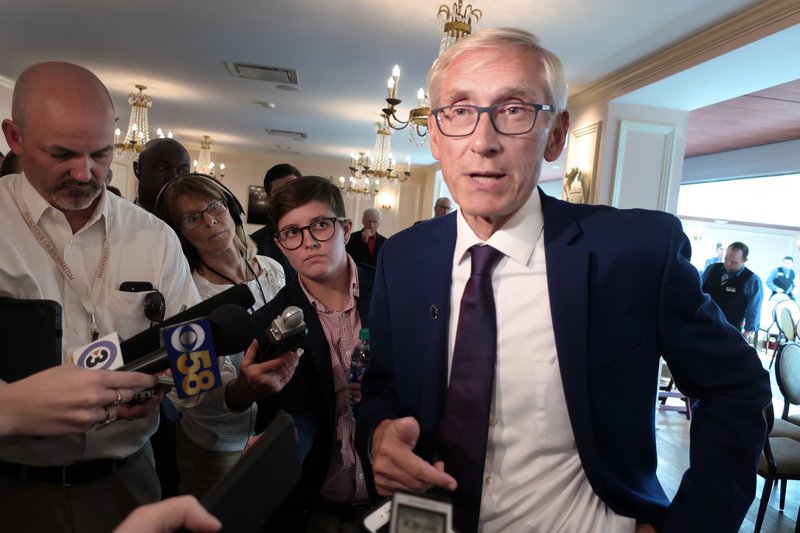Politics
Wisconsin governor lashes out at GOP Senate over ag secretary firing

Wisconsin’s Democratic Gov. Tony Evers is lashing out at Republicans who control the state Senate after they voted to fire his agriculture department secretary.
Evers watched the debate Tuesday from the floor of the Senate, a highly unusual move for a governor. Minutes after the Senate voted to fire the secretary, Evers told reporters he was “p.o.’d” and described the vote using an expletive.
Evers says Republicans were trying to send a signal to other Cabinet secretaries who haven’t been confirmed to keep quiet. Evers says he won’t tell his Cabinet secretaries to remain quiet in order to protect their jobs.
Republicans were unhappy with the agriculture secretary, Brad Pfaff, because of critical comments he made about the Legislature and his efforts to change rules designed to lessen the impact of the stench of manure on neighbors of farmers.
Republicans and Evers have been fighting since before Evers even took office. Republicans convened a lame-duck session to pass laws weakening Evers’ power in December. This summer, Evers used his expansive veto to reshape the GOP-passed state budget, resulting in attempts in court and through a constitutional amendment to weaken his veto authority. And on Thursday, Evers wants to force the Legislature to take up gun control bills in a special session, but Republicans plan to gavel in and out without debate.
But rejecting a Cabinet secretary is a new move not seen since at least before 1987, based on Legislative Reference Bureau records, and no one has cited an example prior to that.
Evers injected more drama into the vote, showing up on the floor of the Senate sitting through nearly two hours of debate. He sat just behind the Democratic leader and outside the office of the Republican Senate Majority Leader Scott Fitzgerald, who walked over and shook his hand during the debate.
Governors deliver their budget and State of the State speeches on the floor of the Assembly, but it is nearly unheard of for them to show up in either chamber during legislative debate.
The Evers administration, state and federal Democratic office holders and a variety of agriculture industry groups urged Republicans to back off and allow Brad Pfaff to continue to serve in the position he’s held since January. The Senate voted along party lines to fire Pfaff, with all 19 Republicans in favor and all 14 Democrats against.
Democratic Minority Leader Jennifer Shilling said Pfaff’s upbringing on a farm in western Wisconsin helped him understand the needs of farmers and the state’s agriculture community.
“Agriculture is in Brad’s DNA,” Shilling said. “It is who he is. … He was born to do this job, to travel this state and be the cheerleader for the agriculture industry.”
Republican Senate Majority Leader Scott Fitzgerald cited what he called “missteps” Pfaff had with Republicans as justification for his nomination facing rejection. Five Republicans who voted in committee to recommend Pfaff’s confirmation did not speak during debate and refused to answer questions from Democrats about why they changed positions.
Pfaff angered some Republicans when he criticized them for not releasing, more quickly, $200,000 to fund farmer mental health and suicide prevention efforts. Pfaff also upset Republicans and powerful agriculture industry groups when he moved forward with new siting rules, first started under Republican Gov. Scott Walker’s administration, designed to protect farmers’ neighbors from the stench of manure.
Opponents insist the agriculture department didn’t consult farmers on the setbacks and the restrictions are so tough no one will be able to expand their operations. They also fear that local governments that oppose factory farms will use the restrictions to block new operations.
Pfaff on Friday, hours after Fitzgerald said he didn’t have the votes to stay on the job, put the proposal on hold.
Pfaff’s supporters, including groups representing cheesemakers, dairy farmers and corn growers, argued that ousting him now will only create more instability for farmers who are struggling to deal with low milk prices and an ongoing trade war. Wisconsin lost nearly 700 dairy farms last year alone, the highest number of closures since 2011.
Pfaff had worked as deputy chief of staff to U.S. Rep. Ron Kind, a Democrat from La Crosse in western Wisconsin, since 2017 before being picked by Evers to be in his Cabinet. Pfaff was born and raised on a dairy farm in La Crosse County. He previously worked under President Barack Obama’s administration as executive director of the U.S. Department of Agriculture Farm Service Agency.
The Senate was also slated to approve a constitutional amendment Tuesday weakening Evers’ veto powers. It comes after Evers used his expansive veto authority this summer to increase funding for schools, above what Republicans approved in the state budget. The amendment would prevent governors from raising spending with a veto.
That proposal would have to pass the Assembly this session, the full Legislature again in the 2021 session, and win approval from voters before being adopted.
Follow Scott Bauer on Twitter: https://twitter.com/sbauerAP







